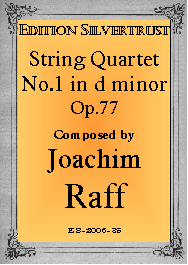Presents
Joachim Raff
String Quartet No.1 in d minor, Op.77
 From
1860 to 1900 the name of Joachim Raff
(1822-1882) was
regularly mentioned in the
same breath as Wagner, Liszt, and Brahms as one of Germany's leading composers.
All of the critical commentaries which appeared during those years spoke of him
as an equal to such masters as Mendelssohn, Schumann, Brahms, and Tchaikovsky.
Incredibly, by the 1920's his music had all but disappeared from the concert
stage. It seems virtually unimaginable that a composer whose talent was
recognized and whose music was admired by Mendelssohn and Liszt, could become a
mere footnote, yet this is what became of Raff and his music for most of the
20th century. Only now is he being rediscovered to the delight of those
fortunate enough to hear his music.
From
1860 to 1900 the name of Joachim Raff
(1822-1882) was
regularly mentioned in the
same breath as Wagner, Liszt, and Brahms as one of Germany's leading composers.
All of the critical commentaries which appeared during those years spoke of him
as an equal to such masters as Mendelssohn, Schumann, Brahms, and Tchaikovsky.
Incredibly, by the 1920's his music had all but disappeared from the concert
stage. It seems virtually unimaginable that a composer whose talent was
recognized and whose music was admired by Mendelssohn and Liszt, could become a
mere footnote, yet this is what became of Raff and his music for most of the
20th century. Only now is he being rediscovered to the delight of those
fortunate enough to hear his music.
Raff was born near Zurich and his family had hoped he would be come a school teacher, but music was his first love. Basically self-taught, Raff sent some of his early compositions to Mendelssohn who immediately recognized his talent and arranged for their publication. Unfortunately, Mendelssohn died before he could help Raff much more. The young composer then approached Liszt who also took an interest in him and took him on as his personal secretary and copyist. During the six years he spent with Liszt, Raff became a member of the so-called "New German School" led by Wagner and Liszt. Although he broke from them in 1856, he was still regarded as a Wagnerite by the supporters of Brahms and the other classicists. In short, Raff was in neither camp, but attacked by both. Isolated, he went his own way, paying little attention to the musical politics of late 19th century Germany.
But going his own way was hardly an easy proposition. Nearly starving, for many years Raff was forced to crank out compositions for the commercial market (works that would sell but were of little intrinsic or artistic merit), one after another as fast as he could. Sadly, this was later to tarnish his legacy. After his reputation had faded, he was regarded merely as a composer of parlor pieces, despite the magnificent symphonic and chamber works he left behind. Anyone who has had the time to hear these great works quickly realizes that Raff could be an impeccable craftsman when he had the luxury of time and was not forced to write for the home music-making marketplace.
His String Quartet No.1 dates from 1855, the last year he spent with Liszt and the moody, nocturnal atmosphere of the work shows that master's influence, especially where Raff seeks to create original sound effects. The big, opening movement, Mässig schnell, ruhig, breit, immediately establishes the dark and brooding temperament that quickly leads to several highly dramatic episodes. Next comes a Mendelssohnian elves-dance, Sehr lustig, möglich rasch, the tempo marking literally telling the performers to play it as fast as possible. The very appealing trio section is quite lyrical and provides excellent contrast. This is followed by a long, slow movement, Mässig langsam, getragen, which begins as a simple and quiet melody (our sound-bite) that Schubert might have written. Gradually, however, Raff begins to explore a new world of tonality which no one would revisit for nearly 30 years until Hugo Wolf and the young Schönberg took up where Raff left off. In the powerful finale, Rasch, the music begins softly with echoes from the scherzo of Beethoven's 9th Symphony. The thematic material rushes onward with incredible drive.
Writing of this work, the famous chamber music critic Wilhelm Altmann states:
"This is an important work worthy of serious study. The formal construction of this quartet shows technique of the highest order and many ingenious tonal effects are produced."
We believe both professionals and amateurs alike will find this a highly attractive work and a welcome addition to their repertoires.
Parts: $24.95